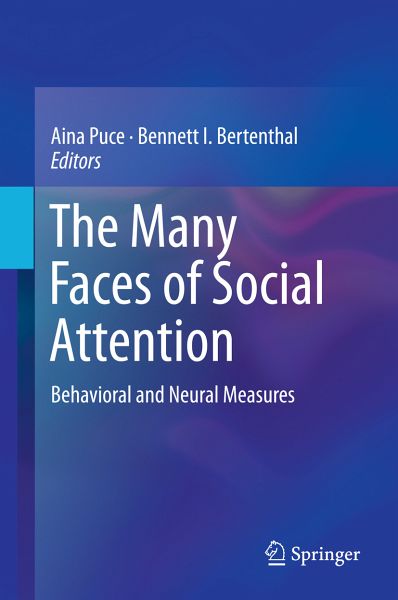
The Many Faces of Social Attention (eBook, PDF)
Behavioral and Neural Measures
Redaktion: Puce, Aina; Bertenthal, Bennett I.
Versandkostenfrei!
Sofort per Download lieferbar
72,95 €
inkl. MwSt.
Weitere Ausgaben:

PAYBACK Punkte
36 °P sammeln!
social neuroscience, social psychology, developmental, psychology, social cognition, vision research and clinical psychology.social neuroscience, social psychology, developmental, psychology, sThis comprehensive volume reviews current developments in our evolving knowledge of social attention and its processes. In doing so, it examines the brain-behavioral bases of social attention from diverse complementary fields, including disordered and healthy adult findings, infant and developmental studies and social neuroscience. The studies explored in this volume reflect the ongoing shift toward natu...
social neuroscience, social psychology, developmental, psychology, social cognition, vision research and clinical psychology.
social neuroscience, social psychology, developmental, psychology, sThis comprehensive volume reviews current developments in our evolving knowledge of social attention and its processes. In doing so, it examines the brain-behavioral bases of social attention from diverse complementary fields, including disordered and healthy adult findings, infant and developmental studies and social neuroscience. The studies explored in this volume reflect the ongoing shift toward naturalistic, context-based experiments and integrative scientific approaches, and away from relying solely on standardized tasks in laboratory settings. In keeping with this proactive perspective, the authors pose critical questions throughout the book to point readers toward the potential next wave of research developments and interventions.
Included in the coverage:
The Many Faces of Social Attention will interest researchers in social neuroscience, social psychology, developmental psychology, social cognition, visual attention and cognition, and clinical psychology, and inspire new advances in this increasingly
important area of study. ocial cognition, vision research and clinical psychology.
social neuroscience, social psychology, developmental, psychology, sThis comprehensive volume reviews current developments in our evolving knowledge of social attention and its processes. In doing so, it examines the brain-behavioral bases of social attention from diverse complementary fields, including disordered and healthy adult findings, infant and developmental studies and social neuroscience. The studies explored in this volume reflect the ongoing shift toward naturalistic, context-based experiments and integrative scientific approaches, and away from relying solely on standardized tasks in laboratory settings. In keeping with this proactive perspective, the authors pose critical questions throughout the book to point readers toward the potential next wave of research developments and interventions.
Included in the coverage:
- The development of social attention in human infants.
- Neural bases for social attention in healthy humans.
- Social attention, social presence, and the dual function of gaze.
- Early departures from normative processes of social engagement in infants with Autism Spectrum Disorder.
- Aberrant social attention and its underlying neural correlates in adults with ASD.
- The future of social attention research.
The Many Faces of Social Attention will interest researchers in social neuroscience, social psychology, developmental psychology, social cognition, visual attention and cognition, and clinical psychology, and inspire new advances in this increasingly
important area of study. ocial cognition, vision research and clinical psychology.
Dieser Download kann aus rechtlichen Gründen nur mit Rechnungsadresse in A, B, BG, CY, CZ, D, DK, EW, E, FIN, F, GR, HR, H, IRL, I, LT, L, LR, M, NL, PL, P, R, S, SLO, SK ausgeliefert werden.












